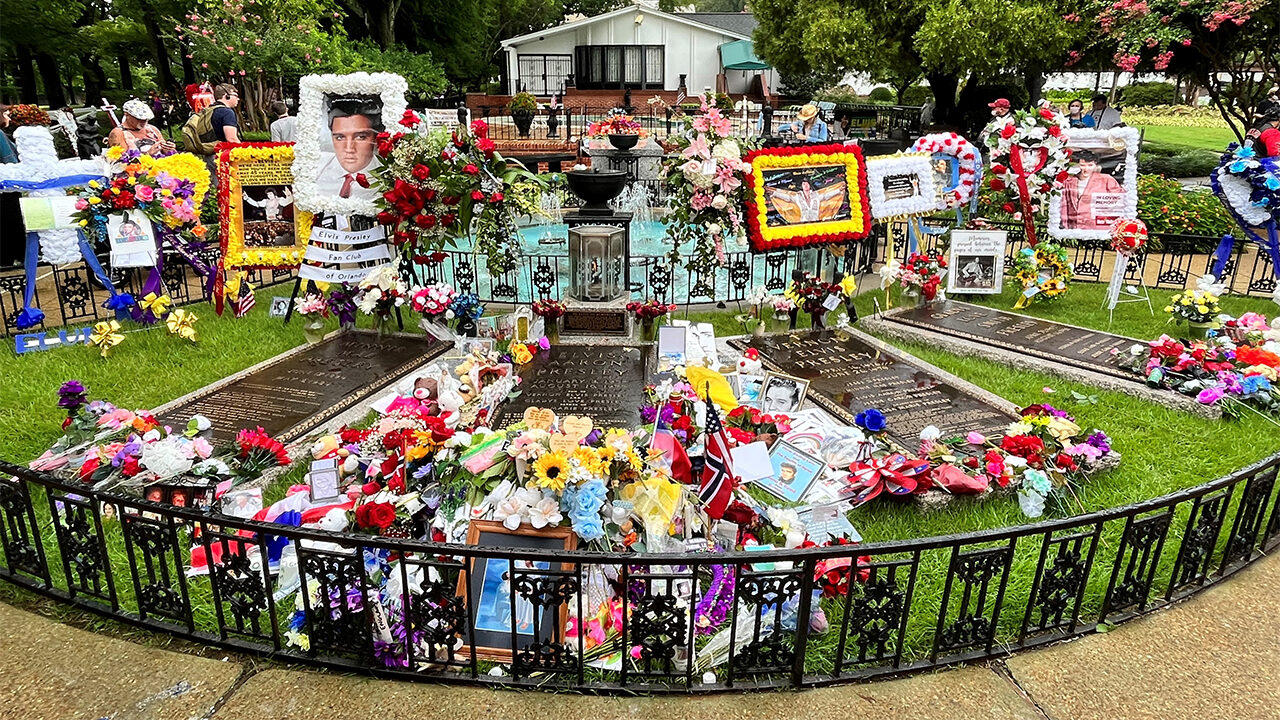
Graceland. I am here, for the first time, for the forty-fifth anniversary of Elvis Presley’s death. The name does not feel apt. Surrounded by sweaty, mutton-chopped worshippers in shiny polyester jumpsuits, women with wrinkly tattoos, and little boys in capes, I gulp down hot, syrupy banana glopped with peanut butter on smashed Bunny Bread to condition myself, then set out to meet the fans who keep a dead man alive as an engine of consumerism, a weird religion, and an inexplicable (to me) lifelong obsession.
They surprise me.
Flo Shaw, who comes every year from Manchester, England, wears a sundress printed with black-and-white Elvis portraits and has his profile on her forearm. She lights up brighter than her raspberry hair as she describes loving Elvis for sixty-seven years (far longer than her marriage). A character, I think happily. Yet as she fields my questions, I sense a toughness and acumen in her worship. She thinks the critics are wrong: “So what if he didn’t write his own songs? The range is incredible—from hillbilly to ballads.”
Fabrizio di Stefano, here from Milan, has been a fan for five years, “full immersion. Vinyl, picture books—I spend all my money that I earn on these things!” Voice carefully neutral, I ask why. “I feel the pureness,” he says simply. “The pureness of Elvis gets into me whenever I listen to his music and see his face. He was different from other entertainers. He was—and we have many people confirming it—he was humble.”
He flew here from Australia, and they drove up on a Greyhound bus and reached Graceland at two in the morning, at which point she looked up, saw a single star in the sky, and murmured, “Elvis, that must be you.”
One of di Stefano’s friends, Marco Erpetti, steps closer. “Excuse me, may I add something? Because he”—jerking his head toward di Stefano—“used to listen to classical music and opera.” He especially loved the tenor Giuseppe Di Stefano (no relation), Maria Callas’s lover after Onassis. “And then he got involved with Judy Garland. Elvis was a fan of Judy Garland, too.”
I ask if there is a common denominator. Both men nod vigorously. “They give us emotion,” Erpetti says. “You can feel their music in your body, in your skin. You can touch their voices. Different types of music, but the same heart.”
In a sea of kitsch, I have managed to land a few intelligent fans. Who can spin a story from that? Somehow this escapade has already gotten away from me, turning oddly serious. I cast about for what ought to be easy, something colorful I can make fun of.
Ah, over there, sprawled on a sofa in the Graceland Guest House lounge: a young woman in a hot pink jacket, black pants, hot pink pointed-toe shoes, and an Elvis haircut. Her grandmother had a clock that sang “Love Me Tender” every hour. Her boyfriend performs as Elvis; they met online in an Elvis group. He flew here from Australia, and they drove up on a Greyhound bus and reached Graceland at two in the morning, at which point she looked up, saw a single star in the sky, and murmured, “Elvis, that must be you.”
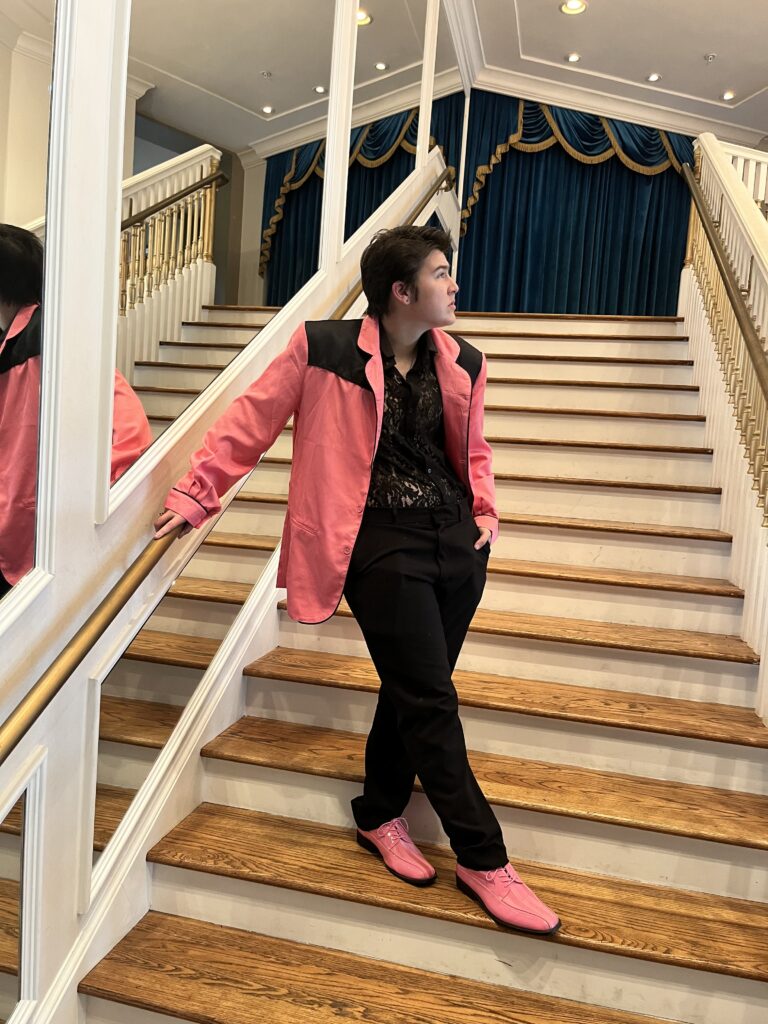
Elvis superfan Sarah Hanselmann, twenty-three, at Graceland. “I was bullied a lot. I was always a tomboy. His music—especially ‘Little Sister’ and ‘If I Can Dream’—kind of pushed me through.” (Photo by Jeannette Cooperman)
I flip open my notebook. Though only twenty-three, Sarah Hanselmann speaks as though she knew the King personally: “When he walked into the room you could just be all down in the dumps, and the atmosphere would just light up. He’d be a prankster. If he sees you being sad, he’d put his arm around you.” Like anyone in love, she cherishes points of connection: “I used to sing in church, and Elvis did, too. I love my momma, and he loved his.” In high school, she says, his style inspired her, and she watched “hours and hours and hours of videos just to see how he did his hair.”
I am scribbling furiously. Adoring, obsessive, over the top—this piece is back on track.
Then she tells me that Elvis saved her from committing suicide.
“I was bullied a lot. I was always a tomboy. His music—especially ‘Little Sister’ and ‘If I Can Dream’—kind of pushed me through.”
• • •
You cannot, I am warned, understand twentieth-century America without Elvis Presley. Sex, drugs, and rock ’n’ roll? The first was his schtick, the second destroyed him, and the third he was credited (wrongly, he insisted) with inventing. He respected God and country, even served in the Army to calm the scandal of his wiggling hips. He loved his momma (Crystal Barbre’s black velvet Pieta paints him in her arms), his guns (Andy Warhol’s Double Elvis shows him shooting from the hip), cars and tv shows and the trashy American food we cherish in secret.
Race and class? He crossed both divides. Grew up in a Memphis housing project alongside Blacks and mixed their blues and gospel with White revival hymns and hillbilly. Made millions but had three trailers parked behind his mansion.
He lived our other contradictions, too: Greil Marcus points to “a love of roots and a respect for the past; a rejection of the past and a demand for novelty.” His early music was about “finding space and freedom”—what could be more American? Only our fascination with youth, and he hit the airwaves just as U.S. teenagers emerged as an entity, a market segment, a trendsetting tribe with sass and spending money and giant finned cars with backseats they were eager to test out. Elvis and his peers gave these kids a music all their own, and they faced off against the grownups, restless energy banging into stuffy, predictable old norms.
The nation’s golden forms, tv and Hollywood, gobbled up his sexy but somehow innocent beauty. A crush on Elvis was exciting, but not James-Dean dangerous; women could swoon in comfort. With celebrity worship now rivaling baseball as the national pastime, Elvis was swiftly repackaged, commodified, and replicated on every buyable object in a froth of capitalism, whipping up appetite.
Our ravenous worship killed the young Elvis long before the drugs he craved as a substitute killed the decadent Elvis. Don’t need us so much, we should have said. Don’t indulge every appetite. Fire that corrupt carnival-barker manager and focus on the music you want to sing.
But his need for us was part of what we loved. There was a sweetness to it, an earnestness, an intensity. It must have been dizzying, to have your god need you as much as you needed him.
• • •
“Why do you love Elvis?” I ask his Belgium fan club.
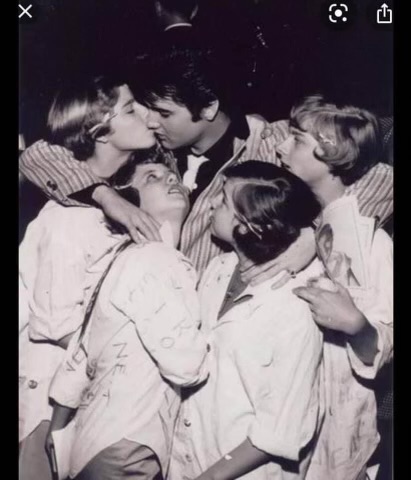
Elvis kissing fan Marilyn Harris (left) with her twin Carolyn Harris nearby (right), and other fans in the middle wishing it were they. (Photo courtesy of Tony Havlin)
“His songs.”
“His looks.”
“Everything.”
“That’s a stupid question.”
Yeah, it probably is. “Okay, what’s your favorite song?” A woman holds out her arm to show me the goosebumps my question has raised. Beneath their Braille are the inked words “Always on My Mind.”
I have my own favorites by now. Before this parachute pilgrimage, I listened to early Elvis for two weeks solid. The sound caught me, loosened my body, had me bopping as I did the dishes. Soon I had no need of Spotify; the songs were looping inside my head.
What would it have felt like to hear that sound for the first time? That antic, sped-up beat, whisking together R&B, gospel, country, opera, and pop and blasting from staticky radios in a year when the top hits were “The Song from Moulin Rouge,” “Vaya con Dios,” and “That Doggie in the Window”?
I ask anyone who looks old enough. “Hot,” I am told. “Exciting.” “Like nothing I had ever heard before.” “New, wildly energetic and crazily gorgeous.” “Permissible rebellion.”
“Before Elvis,” John Lennon said, “there was nothing.”
“There have been several contenders, but only one King”—so sayeth The Boss, Bruce Springsteen.
Erudite literary editor Wilborn Hampton wrote that Elvis’s music “made me want to shout out loud. It was like nothing I had ever heard.” Actor Martin Sheen said Elvis “changed the way we listened.”
And then he was gone.
A crush on Elvis was exciting, but not James-Dean dangerous; women could swoon in comfort.
“Elvis Presley’s death deprives our country of a part of itself,” President Jimmy Carter intoned the following day. Pravda gave Elvis a full-page obituary, announcing that “the USA has given us three cultural phenomena: Mickey Mouse, Coke a Cola, and Elvis Presley.”
Bill Clinton once sang “Don’t Be Cruel” on New York radio, and his code name for the Secret Service was “Elvis.” George W. Bush fed Japanese prime minister Junichiro Koizumi fried peanut butter and banana sandwiches on Air Force One, and when they reached Graceland, Koizumi burst into “Love Me Tender.” Donald Trump gave Elvis a posthumous Presidential Medal of Freedom. Artists regularly mock up a Mount Rushmore that includes his visage.
Elvis Presley was—and remains—the best-selling gold recording artist in history. (Also, even in today’s hypervisual age, one of the most photographed.) He had thirty-eight Top Ten hits and 128 platinum albums. He was inducted into not one, not two, but three halls of fame: Rock ’n’ Roll, Country, and Gospel. Go anywhere in the world, say only his first name, and eyes will light up.
It seems like a long time since anything American found that kind of reach, that kind of shine.
• • •
Young women in the South, raised in the cult of purity and seated with their knees pressed together, watch a handsome young singer jitter and thrust and spread his legs wide, then give them a knowing wink. They scream and reach toward him; some faint. In St. Louis, the girls at Notre Dame High School are persuaded by stern nuns to burn Elvis in effigy, along with all their Elvis photographs, records, and teddy bears. (Surely they hold a few back?)
The sheer physicality of Elvis, his loose, animated sexuality, is what hits audiences first. The emotion, which somehow manages to be both lighthearted and heartfelt, comes a close second. Not only does its intensity pump up the music’s effect, but Elvis is demonstrating, probably without realizing it, a new way to be masculine. Not rugged, not stoic, not a loner. Able to admit that he is sad or lonely or crazy in love. Infused with the shaking, trembling elation he heard in tent revivals and the lust he heard in clubs. His voice vibrates with feeling, an effect Sam Phillips will heighten in the recording studio. Just by being himself, Elvis brushes aside the strong, silent, stiff-legged cowboy types Americans have been raised to think real men.
Think of the miracle of it. A nineteen-year-old boy in the conservative 1950s South who wears makeup and costumey pink and black clothes, dyes his hair black, and curls it with a Toni home perm? An unlikely heartthrob. The first time he comes onstage, a guy in the audience yells the predictable slur.
In St. Louis, the girls at Notre Dame High School are persuaded by stern nuns to burn Elvis in effigy, along with all their Elvis photographs, records, and teddy bears. (Surely they hold a few back?)
But then Elvis Presley starts to sing. And his narrow hips shake. And the girls’ response schools the boys. Broad shoulders, strong jaw, flirty charm, and suggestive movements contradict the deliberate ambiguity—is it a performer’s attention grab? A natural androgyny? His closeness to his momma? The flash of the Black musicians he admires? No one cares. It is too easy for the girls to imagine kissing those full lips. Those sleepy, baby blue eyes, outlined by the black liner Gladys taught him how to use—they pull you in, make suggestions all by themselves.
Later, of course, those eyes will hide, puffy and weak, behind tinted aviators, avoiding a world that turned too bright. But in the good years? “I was in the nosebleed seats,” a slightly drunk woman confides, “but he was singing to me. His eyes! I can’t describe it. Everybody felt it, though. He really saw you.”
Did he, though? Or was it just the eyeliner? “He sang to women as if he were whispering private endearments,” writes Ted Harrison; “he sang to men as their best friend sharing something privileged and confidential.” Which seems manipulative until you remember how nervous he was before every show, how he stammered on words that started with a W, how he paced and worried that he was not good enough. He was still worrying two weeks before he died, telling his backup singer Kathy Westmoreland, “People aren’t going to remember me. I’ve never done anything lasting.”
Just by being himself, Elvis brushes aside the strong, silent, stiff-legged cowboy types Americans have been raised to think real men.
After Elvis’s twin brother, Jesse, died at birth, their mother poured all her grief and love into her only son. You are special, she told him. She was convinced that “when one twin died, the one that lived got all the strength of both.” And so, for Elvis, the bar was hung from the stars.
Who could be special enough for two sons rolled into one? I would bet cash money he really did look into his fans’ eyes, hungry for their love’s reassurance.
• • •
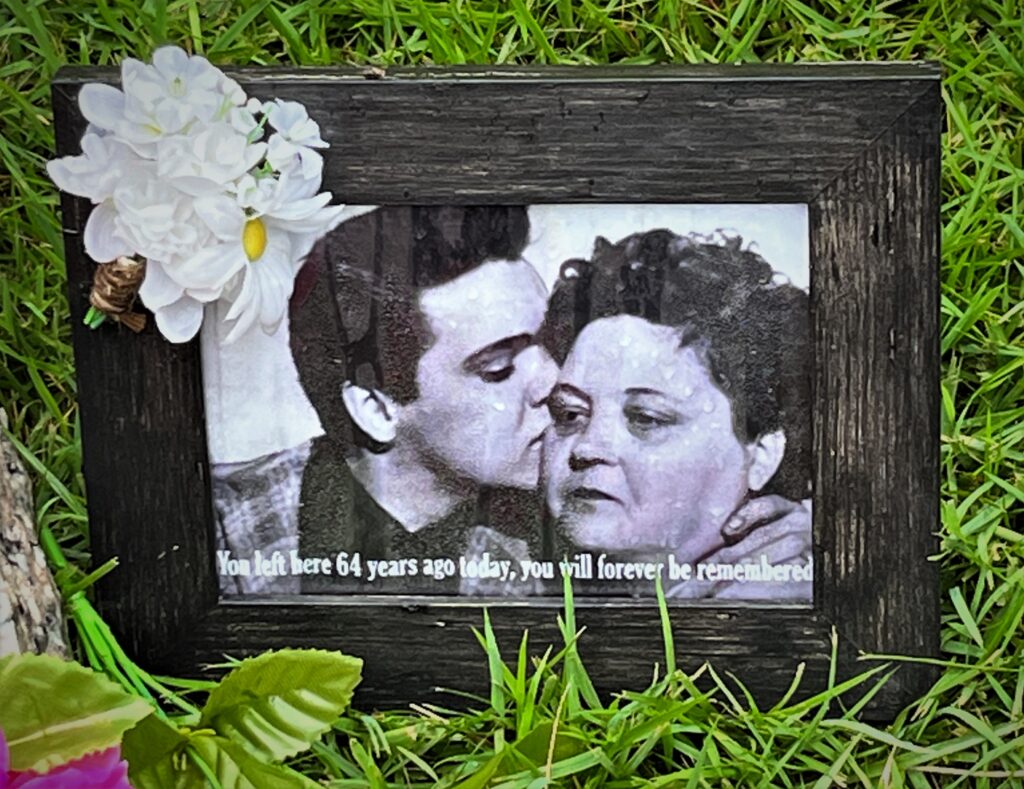
A reproduced portrait of Elvis and his mother. (Photo by Jeannette Cooperman)
At the gravesite, a woman throws a quarter into the wishing well. Then she rummages in her purse and tosses in something so small I cannot hear it land, murmuring, “He’d like this better.” I glance over, not wanting to pry but curious as hell. She gives me a wry grin. “Percoset.”
Our flawed hero, killing a pain nobody ever quite understood. He has everything, by America’s calculus. But he does not have, from age twenty-three on, the steadying, driving, worshipful but stern love of his momma. The woman who knows why he was saved. When his father goes off to prison for forging a check, Gladys throws even more love at Elvis, who is as handsome as his daddy and even has his expression, one side of the mouth lifting in what, on the older man, looked like a sneer. On the son’s fuller lips, it looks cool but never cruel.
“He was the kind of boy even meanness turned sweet in/ his mouth,” writes Joyce Carol Oates.
He obeys Gladys, takes care of her, buys her a pink Cadillac. When she dies, he is unmoored; he has not yet grown away from her. He sets a chair by the casket and sits there for two days. None of the other women will ever replace her—not Hollywood co-star Deborah Paget, his only unrequited love, and not Priscilla, the fourteen-year-old who, a fan whispers to me, looks so much like Paget that Elvis waits for her to grow up. His dubious manager, Col. Tom Parker (who is not a colonel and not Tom Parker but knows how to spin an illusion) promises to take care of Elvis the way his mother would have, and that alone wins him years of foolish, absolute trust.
Fans’ squeals and kisses give Elvis more quick hits of mother love, and he is so grateful, his patience is astounding. Anybody can toss a sweaty scarf into the audience, but how many entertainers would remember, after the first of fourteen autographs he gives Elisabeth Cronin, that her first name is spelled with an s and not a z? How many would pose cheek to cheek with plain, middle-aged women or sling their arm around overweight teenagers and pull them close? Early on, when one of his cousins sees a crowd outside the house, Elvis explains that they like his singing and adds, “They care about me.”
• • •
It would be easier to write about him in chronological order, but the prose jumbles; he is both dead and alive, and even as you marvel at the young rebel angel, Las Vegas Elvis hides in the wings.
It would be cleaner to divide the Elvis who lived from the Dead Elvis his fans later project. At a press conference in the early seventies, he even warns us: “The image is one thing, and the human being is another.” Yet it is virtually impossible to separate Elvis from his fans. “They want what I got only it ain’t mine,” Alice Walker writes in “Nineteen Fifty-Five,” a brilliant piece of fiction that captures Elvis better than all the facts combined. “That’s what makes ’em so hungry for me when I sing.”
I cannot even divide thoughts about race from thoughts about class, because in this country, the two are inextricable.
He is both dead and alive, and even as you marvel at the young rebel angel, Las Vegas Elvis hides in the wings.
There are so many ways Elvis might not have been Elvis. If he had the voice but not that frenzied motion that began as stage-fright nerves and turned, the minute he heard the girls screaming, into a teasing, sexualized display. If he had come of age any time after the shockable fifties. If he had been born anywhere but the American South. (“Ladies and gentleman, here from Boise, Idaho…!”) But the real dealbreaker? If Elvis had been born to money.
In Memphis, people keep telling me about Tupelo, Mississippi—how Elvis is born in the poorest state in the nation; how the Presleys’ two-room house, just off Pig Trot Trail, has no running water. How the bank takes back the house when Elvis is three; how he hears his parents fretting about money and vows at age four to take care of them; how they eat squirrel and probably go hungry a lot and “that’s why he gets so fat later on.” Above all, people stress, he “never forgot where he came from.” “He cared about his fans and respected them.”
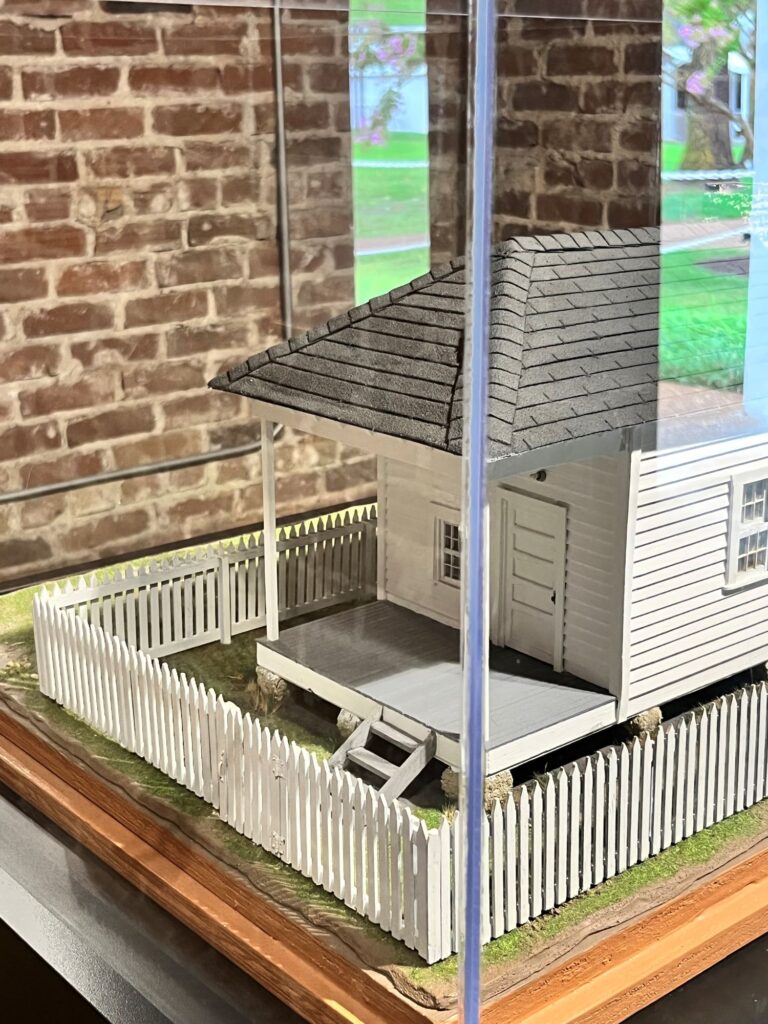
A scale model of Elvis’s childhood home in Tupelo, Mississippi. (Photo by Jeannette Cooperman)
He is what we used to be automatically proud of: a poor boy made good. American mythology regularly uses rags to vindicate riches, but these fans carry it further, taking comfort from the way he honors his roots, stays polite, is what my mother-in-law used to call “salt of the earth.” They understand why he keeps his Memphis Mafia around him, sure he can trust those who knew him back when, and why he ducks away from the avant-garde, shrugging in explanation: “You can’t go beyond your limitations…. I stay with my own kind of people.”
What today’s academics forget, in the belated focus on race, is that class is what exposes him. He grows up near Blacks and hangs out in the Shake Rag neighborhood, an oasis of Black culture. When the Presleys move to Memphis, they again live side by side with Black families, this time in a housing project. Elvis is easy in Black circles, appreciative of Black music, eager to dress as colorfully as Black musicians and move as freely.
After high school, he gets a job as a truck driver. He does no networking, no schmoozing, just pays $4 to make a record that will be his momma’s birthday present. Savvy Sam Phillips, on the lookout for a White man who can sing Black music, hears the recording and shoots Elvis out of a cannon. He lands dizzy and disoriented.
“Although intelligent and a seeker after knowledge, Elvis lacked an education that could help him make sense of the world and his place in it,” write the authors of Elvis Presley: Reluctant Rebel. “Like many poor Southerners of his time, he bristled against authority but ultimately fell in line.” Which sounds snooty as hell but captures the rebel–good country boy contradiction nicely. Well into adulthood, Elvis still wants to be a superhero: he collects honorary police badges, races to the rescue when a car crashes outside Graceland, rescues people with money and cars and gifts.
Imagine if his enthusiasms had changed; if he had handed out Ming jade instead of Cadillacs, Beluga caviar instead of Smith & Wessons. Would people still be praying at Elvis shrines, cooking from the Are You Hungry Tonight cookbook, sleeping with an Elvis teddy bear?
• • •
A hard early life shaped Elvis, birthed his cravings, opened his influences. That said, the fans pouring through the Graceland turnstile exhibit markers of varying wealth and taste—but are nearly all White. Called a “hillbilly cat” and a “white Negro,” Elvis blended those separate worlds with ease, but his fan base does not.
Casually, I grill Black residents of Memphis, and what I hear is a little strained. No animus, just a recognition of whose music came first. Big Mama Thornton recorded “Hound Dog” four years before Elvis did. Chuck Berry was neck and neck with him, blending the same kind of rhythms. Elvis learned big lessons from B.B. King and Little Richard, and when somebody called Elvis the king of rock ’n’ roll, he pointed to Fats Domino instead.
Bo Diddley laid it out calmly: “When Elvis came along, he snatched my little wigglin’ idea…. It ain’t his fault, but when he did it, I got shoved back into the corner.” At the time, the thought of young Southern White girls swooning over a Black guy’s wigglin’ might have set the country on fire. Yet I find myself wanting to defend Elvis—first because I am tired of the imposition of newfound sensitivity on a crude past, and second, because actions speak. When he starts recording for Sun Studio, interracial marriage is classed a crime, and Tennessee laws enforce segregation on public transportation, in public washrooms, and in mental hospitals (where Black patients must be kept in a separate building). Yet Elvis shows up at the Memphis Fairgrounds on “colored night” and thinks nothing of being the only White person at a Black charity gala.
Casually, I grill Black residents of Memphis, and what I hear is a little strained. No animus, just a recognition of whose music came first. Big Mama Thornton recorded “Hound Dog” four years before Elvis did.
In 1988, Chuck D of Public Enemy will pronounce him a “straight up racist.” But twenty-six years later, Chuck D will admit that he had no evidence to back that up. He just made Elvis “the fall guy” because it was so annoying to see Americans raise him up as the King and ignore the Black history of that music. Sam Phillips was the first profiteer, though; he knew enough about record buyers to realize he needed a White man to sing the music teenagers were so crazy about. Seeing through the filter of race, he described Elvis’s sense of inferiority as “markedly that of a black person.”
But here we are muddling race and class again, because Elvis’s sense of inferiority was markedly that of a kid from Tupelo whose parents were barely literate and whose largest ambition until that moment was becoming an electrician. Blue-eyed Elvis, blond without the hair dye, might have been a sharecropper’s kid, but he was most definitely White, attracting White fans, earning millions from White recording companies, and surrounding himself with a White Memphis Mafia wearing white summer suits. “With wings they could pass for angels, with hoods they could be the Klan,” Alice Walker writes. And that was the Black conundrum: deciding which Elvis was.
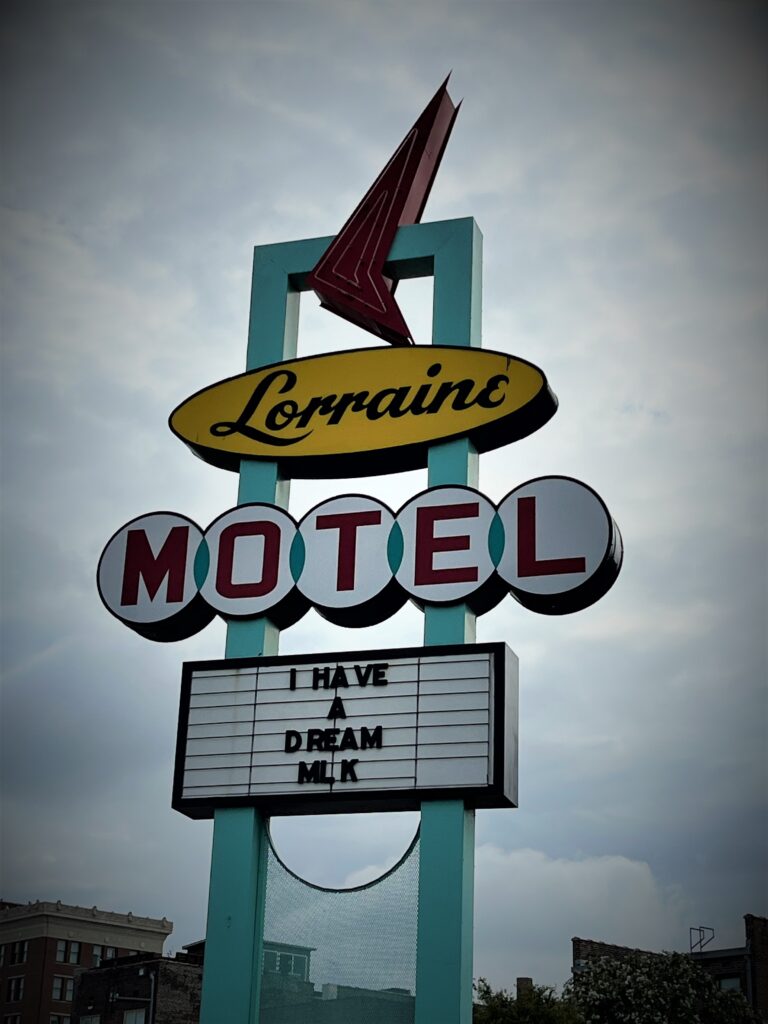
The Lorraine Motel, fifteen minutes from Graceland, where the National Civil Rights Museum is now housed. (Photo by Jeannette Cooperman)
Elvis’s conundrum was who his manager was. Parker insisted that his star stay out of the civil-rights struggle. When he heard the song “If I Can Dream,” he spat, “That ain’t Elvis’s kind of song.” Elvis pleaded, “Let me give it a shot, man.” The lyrics had been written for him after King was assassinated at the Lorraine Motel, fifteen minutes from Graceland.
The National Civil Rights Museum is now housed at the motel. When I go, the museum is crowded but, except for the videos, eerily quiet. At Graceland, the silence is sweet and worshipful, drenched in private nostalgia. This silence is deeper, and bleak, not comfortable at all. Two Kings died in Memphis. One felt so addled and empty, he killed himself with drugs. The other tried to teach an entire country to resist hatred—and got killed for it.
My urge to defend Elvis is losing velocity fast. Not because of who he was, but because that history of exploitation looms so large. Did he “steal” Black music and movement? He absorbed it and wove it into his own, which was common practice among musicians of the time—but he made an insane amount of money by building off that material. In the fifties, Blacks were still fighting just to get an education, fair pay, and a seat on the bus. They had no time to protect their art or sue for royalties, just as their forebears had no way to challenge the obscene profits of the plantation owners who enslaved them.
Two Kings died in Memphis. One felt so addled and empty, he killed himself with drugs. The other tried to teach an entire country to resist hatred—and got killed for it.
When Elvis sang the blues, he could sing it “free of all worry, all sin; a simple joy with no price to pay.” This made his music palatable to White audiences. He gave credit to his inspirations, and he was generous with his cash, and he, too, was exploited. Nonetheless, he was part of a larger pattern. We all are.
• • •
Most of Graceland is posed and framed, roped off, boxed in glass. But in the home movies’ faded technicolor, you can watch Elvis learning how to live his new, fairy-tale life. He is settling into the wonder of it all.
Then comes a lull in his career, and the Beatles, who have grown up idolizing Elvis, supplant him.
The big comeback concert comes in 1968. Clad in black leather, his swagger back at full throttle, Elvis stalks onto the tiny stage and announces, “If you’re looking for trouble, you’ve come to the right place.” Surrounded by goggle-eyed fans, he launches into the old rockabilly standards. The following year, bucked up, he records “Suspicious Minds” and “In the Ghetto,” smashing the safe Elvis that Col. Parker has tried so hard to create.
Rather than give up, Parker settles his own gambling debts by landing Elvis a multi-year contract in Las Vegas.
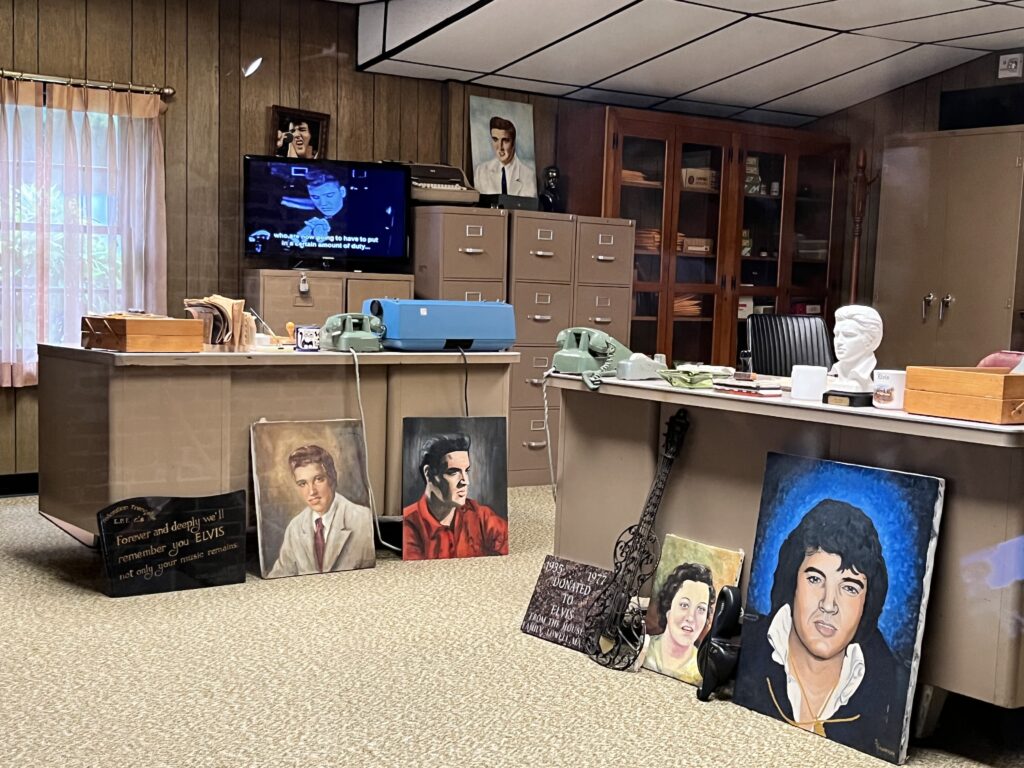
The office of Vernon Presley, Elvis’s father. (Photo by Jeannette Cooperman)
This is Part II of the takeover. Part I came back in 1955, when RCA signed Elvis to a $40,000 contract and it became clear that he was no longer his own man, but the property of those who were profiting from him. He must sing “Hound Dog” to a basset hound; he must wear a suit; he must be filmed only from the waist up on The Ed Sullivan Show, where he will duck his head in pleasure when Sullivan pronounces him “a real, decent, fine boy.”
He never tours Europe; Parker turns down the invitations with bogus excuses to hide the fact that he has no passport. He never gets to make good movies, because Parker snaps up a succession of dumb, saccharine, formulaic films that make faster money. He does not write or compose, so he is stuck singing what the crowds want to hear.
In 1970, while he is rehearsing “Stranger in My Own Hometown,” the blues lyrics loosen what might be a hint of disenchantment. Fooling around, he inserts his own thoughts without missing a beat: “I’m goin’ back down to Memphis. I’m gonna start drivin’ that motherfuckin’ truck again…. All them cocksuckers stopped being friendly.”
By the time he sings “Burning Love” three years later for the Aloha from Hawaii concert, the mold has set. Elvis is a stiff, hard plastic action figure of himself. Only one knee jiggles, and his corset is surely too tight, because the most plausible line is “It’s hard to breathe.” A little hip action at the song’s very end, then a big punch and outstretched guitar for the finale. Shorthand for what used to be continuous, felt motion.
In Las Vegas, which seemed like a playground to a younger Elvis, audiences are half drunk and eager for bland, familiar ballads they can sway to while they forget how much money they just lost. One night, back in the hotel, he turns on tv, hears Robert Goulet’s smarmy crooning, and shoots out the picture tube with his .44 Magnum.
He spends the next years puffy, bloated, and dazed, that rapid-fire speech slowed to a crawl. People who still remember the physicality of those early performances slam him for being fat, shoveling milkshakes and fried food into that once beautiful body.
He jacks himself up, numbs himself to sleep, does month-long stints of back-to-back shows at The International Hotel, zipped into his White Conquistador jumpsuit, his White Flower Jumpsuit, his Black Spanish Flower Jumpsuit with Green Stones—androgynous to the end. By now he is paranoid, often deluded, hungry for mystical answers, riddled with fetishes and phobias. When Raquel Welch sees him in Vegas—this man who was her first conjuring of “what a sexy guy could be”—he is still sweet, but Lord is he sparkly. He shows her all his jewelry. He is not, she notices, “really happy in his eyes.”
In the seven and a half months before Elvis’s death in 1977, his doctor writes prescriptions for at least 8,805 pills, tablets, vials, and injectables. How can he reach clarity, let alone courage, through that chemical fugue?
Bu now the country has lost its rebellious edge, too. The Horatio Alger narrative has some serious barriers to entry. Almost every rock star presents as androgynous and spews emotion. Sexed-up teenagers have been normalized, clinicalized, and warned of disease. The revolution is over, and the struggles for various freedoms have subsided.
While Elvis lost his purity, we were losing our innocence.
He never tours Europe; Parker turns down the invitations with bogus excuses to hide the fact that he has no passport. He never gets to make good movies, because Parker snaps up a succession of dumb, saccharine, formulaic films that make faster money. He does not write or compose, so he is stuck singing what the crowds want to hear.
His slide is sad, his death the collapse of a supernova. You want to rail against Parker or Las Vegas or capitalism’s wild swings or the drug-pushing Dr. Nichopoulos. But maybe Elvis had to be young to burn that bright. Maybe it never would have mattered that his manager took his money and blunted his edge, or that his wife left him, or that he gained weight and gulped drugs and became ridiculous. Maybe he never could have sustained the comeback magic, because so much of what he was about was youth in America. Sexual awakening, high energy, movement. Chuck Berry did his duck-walkin’ best, but really, who can sustain that?
Elvis’s fans kept the flame burning long past logic, because every so often, they glimpsed the early passion. “Something in me yearns for a settling of affairs, he said with his pale music and his tired movies,” writes Greil Marcus; “on the other hand, he answered with his rock ’n’ roll and an occasional blues, I may break away at any time.”
• • •
Rain slants down, and eager visitors form a long line, shifting from one foot to the other, tugging at dripping plastic ponchos, waiting to enter the mansion. A man stops at the front steps and slowly bends, stalling the line while he inches all the way down to kiss the wet stone.
More than half a million people visit Graceland every year; in 2016, the cumulative total hit 20 million. The place is immaculate and atmospheric, the Jungle Room a moody fantasy, the tv room a Space Age chrome yellow. But even filled with shuttle bus loads of gawkers, the place feels empty.

The TV room at Elvis’s mansion. (Photo by Jeannette Cooperman)
When Austin Butler was preparing to play Elvis in Baz Luhrman’s biopic, Priscilla Presley informed him that he had some big shoes to fill, then gave him a reassuring hug and asked if he had been to Graceland yet. “I really think that’s where his spirit is,” she said softly. A lovely thought—except that Elvis’s spirit required a crowd of Memphis Mafia, people laughing, cutting cake, barbecuing out back, giddily driving golf carts or riding horses, there to be called whenever he could not sleep.
He never learned to be alone.
A fan pauses in front of a worn black leather wallet that once rested against her King’s buttocks. Another stops at a photograph and frowns, surprised she does not recognize the woman. She stands there a long time, puzzling it out: “I know it’s not Dixie, but I don’t think it’s Anita, either….” I hide a smile: there were hundreds of women; it could be anyone. He hungered for spiritual answers, but his distractions were quick and warm and easy: women, food, televisions, guns, cars, motorcycles, the pool, the pool table, the racquetball building where he summoned friends to play at four in the morning on the day of his death….
Moving on, I find myself in front of a life-sized, lurid painting of Elvis, clad in a shiny white jumpsuit, surrounded by gold, with a misty cloud swirling around his feet. Apotheosis.
• • •
Nobody thinks Elvis is alive anymore. I am almost disappointed. Shoot, he would only be eighty-seven. The autopsy report that his daddy sealed for fifty years will not be released until 2027. Maybe he knew that the rumors, like the shock of sudden grief, would help keep his boy alive.
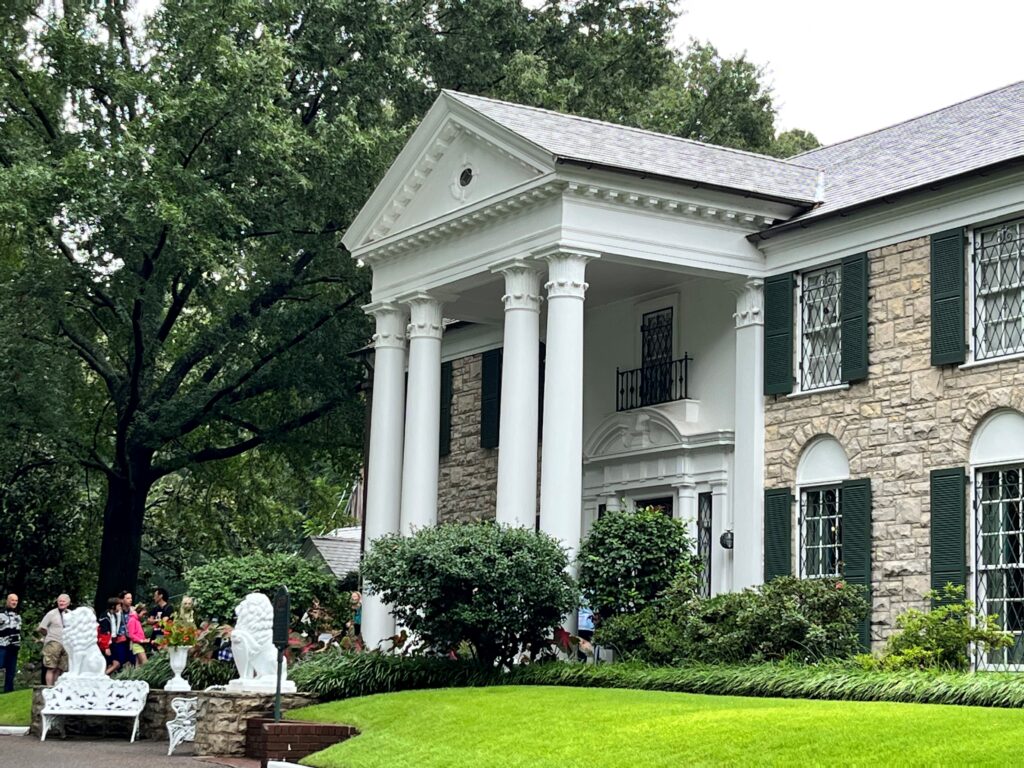
The frontside of Graceland. (Photo by Jeannette Cooperman)
Elvis died a wreck, but his fans restored his purity with tears and memories. He died broke, but capitalism corrected the bottom line, opening Graceland to the public in 1982. Today the mansion feeds into a Disneyfied complex of mini museums; I count eight gift shops before I stop bothering. Elvis stuff is everywhere—not the irreverent voodoo Elvis or the Elvis zombies or the Elvis votive candles, just licensed kitsch. (Kitsch being, by Milan Kundera’s definition, the denial of death.)
Elvis continues to perform at concerts, via video recordings mixed with live backup. There are all-Elvis radio stations, and an all-Elvis tv station just began streaming. In its first two months, the new biopic grossed nearly $270 million. Next will come two new Elvis albums from Sony and a Netflix action-comedy animated series, Agent King. (How he would love that, this overgrown boy who persuaded President Richard Nixon to give him a drug agent’s badge.) But all of it feels bittersweet, a resurrected life whose trajectory parallels a nation’s.
Elvis died a wreck, but his fans restored his purity with tears and memories. He died broke, but capitalism corrected the bottom line, opening Graceland to the public in 1982.
In 1987, Greil Marcus predicted that after the tenth anniversary of Elvis’s death, the media coverage would itself be so bloated (the inescapable late-Elvis adjective, apt on so many levels) that everyone would finally forget, and Elvis would be definitively dead. “And then, twenty years later…someone like Neal Jiminez will make his movie, and it will all come back.”
Baz Luhrmann just made that movie—but Elvis never did die.
“I can feel him in my heart,” a fan says. “I can see him in my dreams. I can see him on my wall in my posters. That’s the stuff that’s the real Elvis.”
The real Elvis is American, remember, and America is a consumer society. The desires we project, the stuff we buy—that is what feels real to us. It lets us have any Elvis we want.
• • •
I have done this wrong. I should have made more of an effort, found more ridiculousness. Mad at my over-serious self, I rewatch Bubba Ho-Tep, an absurd comedy-horror cult favorite in which Elvis (Bruce Campbell) is stuck in a nursing home where nobody believes he is the real Elvis. He makes friends with a Black guy (Ossie Davis) who claims to be John F. Kennedy. “No offense, Jack, but President Kennedy was a White man,” Elvis drawls, and Jack exclaims, “They dyed me this color! That’s how clever they are!” The two buddy up to stop an ancient Egyptian mummy from terrorizing the nursing home, and the film is even more ludicrous than Elvis’s real life. Also just as poignant, “elevated by Bruce Campbell’s pensive Elvis,” writes Rolling Stone critic Peter Travers, “into a moving meditation on the diminutions of age and the vagaries of fame.”
How a man whose life began in grim poverty and ended in bloated self-parody managed to provide such joy in between—that is the real mystery. The answer lies in the long musical tradition that preceded him, the playful freedom he took with it, the rebellion that hit at just the right time and blasted the old White rules.
Elevated. That is the word I have been groping for. Like Bubba Ho-Tep, Elvis has been raised up by fans who looked beneath the dazzle of sex and celebrity and the tawdry decline and found someone humble enough to relate to. Someone who lived the sort of life they could only dream, yet never moved away from them. Someone who made it all right to feel sexy, daring, lonely, or hungry; to like tacky or tawdry stuff; to ask for attention and laugh at yourself while you did.
How a man whose life began in grim poverty and ended in bloated self-parody managed to provide such joy in between—that is the real mystery. The answer lies in the long musical tradition that preceded him, the playful freedom he took with it, the rebellion that hit at just the right time and blasted the old White rules.
He left plenty of kitsch in his wake, plenty of pseudo-religion, plenty of Elvis jokes—but he was not, is not, a joke. He lived our contradictions, released our inhibitions, and lost himself in the process.
Read more:
The pilgrimage Paul Simon could not avoid
